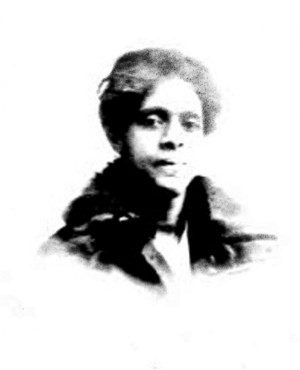Addie Waites Hunton facts for kids
Quick facts for kids
Addie Waites Hunton
|
|
|---|---|
 |
|
| Born | June 11, 1866 Norfolk, Virginia, U.S.
|
| Died | June 21, 1943 (aged 77) Brooklyn, New York, U.S.
|
| Nationality | American |
| Education | Boston Latin School, Spencerian College of Commerce |
| Spouse(s) | William Alphaeus Hunton |
| Children |
|
| Parents |
|
Addie Waites Hunton (born June 11, 1866 – died June 22, 1943) was an important African-American leader. She worked for women's right to vote, fought for equal rights for black people and women, and was a writer, organizer, and teacher. In 1889, Addie Hunton made history by becoming the first black woman to graduate from Spencerian College of Commerce. She worked for the Young Women's Christian Association (YWCA) and was a national organizer for the National Association of Colored Women (NACW). She even helped the U.S. Army during World War I.
Contents
Early Life and School
Addie D. Waites was born in Norfolk, Virginia, on June 11, 1866. Her parents were Jesse and Adeline Waites. When Addie was very young, her mother passed away. She then moved to Boston to live with her aunt.
In Boston, Addie went to the Boston Latin School and finished high school. After that, she attended Spencerian College of Commerce. In 1889, she became the first black woman to graduate from this college.
Her Work and Contributions
After college, Addie Hunton moved to Normal, Alabama. She started teaching at the State Normal and Agricultural College. Today, this school is known as the Alabama Agricultural and Mechanical University.
In 1907, the YWCA recognized Addie Hunton's talents and made her a secretary. Her job was to create programs for black students. She traveled across the South and Midwest. She gathered information for the YWCA to help the black community. Addie Hunton was known for her efforts to improve social welfare for black people. She also encouraged other black women, like Eva del Vakia Bowles and Elizabeth Ross Haynes, to work for the YWCA.
From 1909 to 1910, Addie Hunton and her children lived in Europe. Her husband stayed in the U.S. because he was not well. While in Europe, they lived in Switzerland and then in Strasbourg, Germany. There, she studied part-time at Kaiser Wilhelm University. When they returned to America, she continued her work with the YWCA. She also took classes at the College of the City of New York. Her husband, William, was very sick with tuberculosis. The family moved to Saranac Lake, New York, and he passed away in 1916.
Helping During World War I
In 1917, the U.S. joined World War I. Addie Hunton quickly got involved through the YMCA. In June 1918, she sailed to France. She was one of only three black women assigned to work with the 200,000 black troops there. The other two were Kathryn Johnson and Helen Curtis.
In France, Addie Hunton saw how unfairly black soldiers were treated. The American Command tried to control their lives, similar to the unfair rules known as Jim Crow laws back home. Addie Hunton worked in the Services of Supplies section. She started many new programs to make the soldiers' lives better. These included reading classes and discussions about art, music, and religion.
One very difficult task she had was in May 1919. She was sent to a military cemetery. Her job was to support black soldiers who were recovering bodies from the battlefield of the Meuse-Argonne. These soldiers then had to rebury them.
Her Family Life
In July 1893, Addie married William Alphaeus Hunton. He was working in Norfolk, Virginia, to create YMCA branches for black youth. Addie worked closely with her husband as his secretary. In 1899, the couple moved to Atlanta, Georgia. There, Addie gave birth to four children, but only two survived. One of them was Eunice Hunton. After seven years in Atlanta, the family moved to Brooklyn, New York. They moved because of the Atlanta riot of 1906, as they worried about their safety.
In 1914, Addie's husband William passed away. After the war, Addie Hunton and Kathryn Johnson wrote a book together. It was called Two Colored Women With the American Expeditionary Forces (published in 1920). This book shared their experiences during the war and how black American soldiers were treated. In 1938, Addie Hunton wrote another book about her husband's life and work. It was titled William Alphaeus Hunton, A Pioneer Prophet of Young Men. She passed away in Brooklyn on June 21, 1943.
Her Lasting Impact
Addie Hunton is remembered for her strong belief in peace and her work for good race relations. She also worked hard to empower the African-American community, especially women. She developed a three-part plan for peace. First, she wanted African-American women to create their own international organization. Second, she believed black women should join the Pan-African movement, which mostly included men at the time. Finally, she aimed to involve African-American women in the mostly white U.S. peace movement.
Works
- William Alphaeus Hunton: A Pioneer Prophet of Young Men. 1938
- Two Colored Women with the American Expeditionary Forces, with Kathryn M. Johnson. 1920

